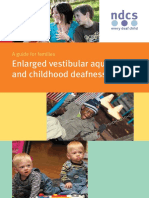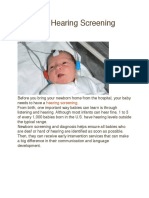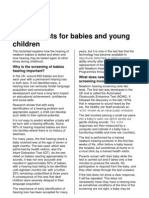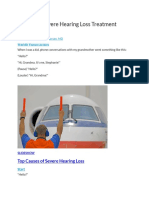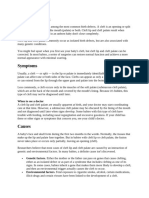Ear Fluid and Newborn Hearing Screening: Patient Information On
Ear Fluid and Newborn Hearing Screening: Patient Information On
Uploaded by
Merlin NoronhaCopyright:
Available Formats
Ear Fluid and Newborn Hearing Screening: Patient Information On
Ear Fluid and Newborn Hearing Screening: Patient Information On
Uploaded by
Merlin NoronhaOriginal Description:
Original Title
Copyright
Available Formats
Share this document
Did you find this document useful?
Is this content inappropriate?
Copyright:
Available Formats
Ear Fluid and Newborn Hearing Screening: Patient Information On
Ear Fluid and Newborn Hearing Screening: Patient Information On
Uploaded by
Merlin NoronhaCopyright:
Available Formats
PATIENT INFORMATION ON
Ear Fluid and Newborn
Hearing Screening
QUESTION SUGGESTED RESPONSE
How many babies who fail their Only a very small number of babies who fail will have permanent hearing loss;
newborn hearing screen will really overall, only about 2 or 3 of every 1,000 children in the United States are born
deaf or hard of hearing.
have hearing loss?
How common is middle ear fluid in Middle ear fluid is a very common cause of a failed newborn hearing screen
children who fail a hearing screen? and is found in about 6 out of every 10 children who fail. The fluid will often go
away on its own in the first few months of life, but if it does not, it may require
help from a doctor to remove it.
Can I assume that middle ear fluid No. The newborn hearing screen cannot determine the cause of hearing loss.
is the reason for the failed test? About 90% of the time, hearing loss goes away when the fluid does, but 10%
of children may still have a hearing loss that need further medical attention.
For this reason, it is very important to retest your child’s hearing after fluid is
gone.
If my child gets ear tubes, how For about 70% of children, hearing loss caused by fluid will go away right after
long will it take before the fluid’s the tubes are in place; however, for about 30% of children, it could take up to
several months before hearing improves. So if your child still has some hearing
effect on hearing goes away? loss after getting tubes, keep in mind that hearing could still improve over time.
Are some babies more likely to Middle ear fluid is more common in children with an abnormal roof of their
have problems with middle ear mouth (called “cleft palate”), those with atypical face shape or skull bones, or
with those who have certain inherited (genetic) problems.
fluid than others?
If my baby seems to hear normally, Parent assessment of child hearing is not always accurate, so it is important
can the tests be wrong? to have the child’s hearing professionally tested. Just because a baby reacts to
sounds does not mean the child has full range of hearing; a baby may hear cer-
tain sounds but not others. Only a professional hearing test that checks each
ear separately can accurately tell how your child hears.
OME = otis media with effusion
SOURCE: Rosenfeld RM, Shin JJ, Schwartz SR, et al. Clinical practice guideline (update): otitis
media with effusion. Otolaryngol Head Neck Surg. 2016;154(1 Suppl):215-225.
ABOUT THE AA0-HNS/F
The American Academy of Otolaryngology–Head and Neck Surgery (www.entnet.org), one of the oldest med-
ical associations in the nation, represents about 12,000 physicians and allied health professionals who spe-
cialize in the diagnosis and treatment of disorders of the ears, nose, throat and related structures of the head
and neck. The Academy serves its members by facilitating the advancement of the science and art of medicine
related to otolaryngology and by representing the specialty in governmental and socioeconomic issues. The
AAO-HNS Foundation works to advance the art, science, and ethical practice of otolaryngology–head and neck
www.entnet.org
surgery through education, researach, and lifelong learning. The organization’s vision: “Empowering otolaryn-
gology–head and neck surgeons to deliver the best patient care.”
You might also like
- Enlarged Vestibular Aqueducts and Childhood Deafness PDFDocument20 pagesEnlarged Vestibular Aqueducts and Childhood Deafness PDFNics GanoNo ratings yet
- Ligature Strangulation - StudentsDocument28 pagesLigature Strangulation - StudentsBoţu Alexandru100% (1)
- ACPA Booklet Helpwithhearing WebDocument16 pagesACPA Booklet Helpwithhearing WebAhmed AshfaqNo ratings yet
- HSC 430 Childhood Disease PaperDocument10 pagesHSC 430 Childhood Disease Paperapi-502687231No ratings yet
- Listen: What'S in This Article?Document6 pagesListen: What'S in This Article?KamlaNo ratings yet
- Earproblemsinchildren WithcleftpalatesDocument3 pagesEarproblemsinchildren Withcleftpalatesane_dokter1905No ratings yet
- HearinglossfactsheetDocument2 pagesHearinglossfactsheetapi-239968581No ratings yet
- Papers About EarsDocument24 pagesPapers About EarsFajra FajiraNo ratings yet
- Meningitis and Childhood Deafness#1 PDFDocument28 pagesMeningitis and Childhood Deafness#1 PDFBebenzzzNo ratings yet
- Childhood Deafness With AllDocument63 pagesChildhood Deafness With AllMunadiNo ratings yet
- Gordon 2015Document15 pagesGordon 2015María Victoria Hernández de la FuenteNo ratings yet
- New Born Hearing FactsDocument8 pagesNew Born Hearing FactsAhiawortor Kplorla100% (1)
- Hearing Tests For Babies and Young ChildrenDocument6 pagesHearing Tests For Babies and Young Childrengwenkz011No ratings yet
- Slide InggrisDocument41 pagesSlide InggrisWiwiek LibraniNo ratings yet
- Your Baby's Hearing Screening and Next StepsDocument6 pagesYour Baby's Hearing Screening and Next Stepsrameezchaudhary964No ratings yet
- Intervention For Hearing LossDocument30 pagesIntervention For Hearing LossnadersakiNo ratings yet
- Universal Newborn Hearing Screening in India 1588571456 PDFDocument3 pagesUniversal Newborn Hearing Screening in India 1588571456 PDFSomya RainaNo ratings yet
- Adenoids: What Are They & How Do They Affect My Child's Hearing?Document2 pagesAdenoids: What Are They & How Do They Affect My Child's Hearing?Wahyu JuliandaNo ratings yet
- On Ect: Can You Hear Me Now? GoodDocument5 pagesOn Ect: Can You Hear Me Now? Goodabrook8877No ratings yet
- Hearing LossDocument4 pagesHearing LossNataya Anita IsabellaNo ratings yet
- Dos and Don'ts of Earwax (Cerumen) : Patient InformationDocument1 pageDos and Don'ts of Earwax (Cerumen) : Patient InformationPsycholytic_elfNo ratings yet
- Beyond Nodules-Diagnostic and Treatment Options in Pediatric Voice DisordersDocument8 pagesBeyond Nodules-Diagnostic and Treatment Options in Pediatric Voice DisordersDaniel Celestino DiazNo ratings yet
- Anotia/Microtia: Minnesota Department of Health Fact Sheet November 2005Document3 pagesAnotia/Microtia: Minnesota Department of Health Fact Sheet November 2005Carlos Santiago VivenzaNo ratings yet
- Ears SCDocument38 pagesEars SCrosesareposie211No ratings yet
- PrevalenciaDocument4 pagesPrevalenciaLaura Sofía Miranda RellánNo ratings yet
- Diagnosis and Management of Congenital Sensorineural Hearing LossDocument10 pagesDiagnosis and Management of Congenital Sensorineural Hearing LossAlifia Nurdani DarmawanNo ratings yet
- About Cleft Lip and Palate: FeedingDocument3 pagesAbout Cleft Lip and Palate: FeedingnarutomovieNo ratings yet
- Gatau Ini ApaDocument6 pagesGatau Ini ApaAlfa KaromahNo ratings yet
- 4 Steps To Severe Hearing Loss TreatmentDocument8 pages4 Steps To Severe Hearing Loss TreatmentTon SawyerNo ratings yet
- Pediatrics 2003 Cunningham 436 40Document7 pagesPediatrics 2003 Cunningham 436 40Putu Agus GrantikaNo ratings yet
- 647 PDFDocument6 pages647 PDFShruthi KyNo ratings yet
- Auditory NeuropathyDocument3 pagesAuditory NeuropathySuprit Sn100% (4)
- Pediatric LesionsDocument12 pagesPediatric LesionsVladimir Fabian Melo DuranNo ratings yet
- Children With Achondroplasia Guidance For Parents and Health Care ProfessionalsDocument22 pagesChildren With Achondroplasia Guidance For Parents and Health Care Professionalshorace35No ratings yet
- Maximizing Auditory SlidesDocument18 pagesMaximizing Auditory SlidesARUNGREESMANo ratings yet
- Hearing Screening Pediatrics 2009Document14 pagesHearing Screening Pediatrics 2009Francisco ValleNo ratings yet
- Keywords: Congenital Deafness, Family Support, Early DetectionDocument8 pagesKeywords: Congenital Deafness, Family Support, Early DetectionAlifia Nurdani DarmawanNo ratings yet
- 360 Degree Evaluation of Cochlear Implantation SurgeryDocument37 pages360 Degree Evaluation of Cochlear Implantation SurgeryleejainNo ratings yet
- Cleft and HearingDocument4 pagesCleft and HearingBedah Mulut UNAIRNo ratings yet
- Chrisanthopoulos Marika 300453 Cleft Lip and PalateDocument14 pagesChrisanthopoulos Marika 300453 Cleft Lip and PalateCharles IppolitoNo ratings yet
- 0 The Child With Hearing LossDocument2 pages0 The Child With Hearing LossGirish SubashNo ratings yet
- Debbie Clason: Contributed By, Staff Writer, Healthy Hearing - Monday, October 26th, 2015Document9 pagesDebbie Clason: Contributed By, Staff Writer, Healthy Hearing - Monday, October 26th, 2015Cyrinne B. RodriguezNo ratings yet
- Your Guide To Better Hearing. VisitDocument32 pagesYour Guide To Better Hearing. VisitPhonac Hearing CentreNo ratings yet
- Ear ExamDocument4 pagesEar ExamYuni SdytheeNo ratings yet
- Cleft Lip and PalateDocument34 pagesCleft Lip and PalateMohd BaigNo ratings yet
- The Profile of Hearing Impairment in Infants and Children 14-2-19 (Dr. Novi)Document29 pagesThe Profile of Hearing Impairment in Infants and Children 14-2-19 (Dr. Novi)EBE THTNo ratings yet
- 2019 - Hearing Loss in The CommunityDocument50 pages2019 - Hearing Loss in The CommunityVaenusha MuruganNo ratings yet
- Accepted Manuscript: Accepted Article Preview: Published Ahead of Advance Online PublicationDocument31 pagesAccepted Manuscript: Accepted Article Preview: Published Ahead of Advance Online PublicationireneaureliaNo ratings yet
- Cleft Lip and Cleft PalateDocument5 pagesCleft Lip and Cleft PalateFreda MorganNo ratings yet
- Syndrome Cleft Lip and PalateDocument8 pagesSyndrome Cleft Lip and PalateValentina Lakhsmi PrabandariNo ratings yet
- Ear Infections: A troubleshooting guide to common childhood ailmentsFrom EverandEar Infections: A troubleshooting guide to common childhood ailmentsNo ratings yet
- Cleft Palate Pregnancy Mouth: Slideshow: Migraine Dos and Don'tsDocument6 pagesCleft Palate Pregnancy Mouth: Slideshow: Migraine Dos and Don'tsBenedictus HanjayaNo ratings yet
- Hearing ImpairementDocument8 pagesHearing ImpairementMARY KENNETH SILVOSANo ratings yet
- Hearing Loss in Children - Treatment - UpToDateDocument13 pagesHearing Loss in Children - Treatment - UpToDateAlexander AdrielNo ratings yet
- The Importance of Early Intervention of Hearing Impaired ChildrenDocument4 pagesThe Importance of Early Intervention of Hearing Impaired ChildrenAkhsaful ImamNo ratings yet
- 683 2Document15 pages683 2M Noaman AkbarNo ratings yet
- whd2016 Brochure en 2Document16 pageswhd2016 Brochure en 2api-311125682No ratings yet
- To Study The Incidence of Sensorineural Hearing Loss Post Meningitis in NeonatesDocument7 pagesTo Study The Incidence of Sensorineural Hearing Loss Post Meningitis in NeonatesIJAR JOURNALNo ratings yet
- Listen UpDocument2 pagesListen UpScott BaezNo ratings yet
- Accessing Hearing and Spoken LanguageDocument46 pagesAccessing Hearing and Spoken Languagesu lynnNo ratings yet
- The Complete Idiot's Guide to Hearing Loss: Learn What You Can Do to Improve Your HearingFrom EverandThe Complete Idiot's Guide to Hearing Loss: Learn What You Can Do to Improve Your HearingNo ratings yet
- Teleradiologi: Cross Reporting & Smart AssignDocument17 pagesTeleradiologi: Cross Reporting & Smart Assignrafael100% (1)
- Anc Inc PNCDocument29 pagesAnc Inc PNCDrArun SinghNo ratings yet
- Maria Artunduaga, MD, MPHC: EducationDocument5 pagesMaria Artunduaga, MD, MPHC: EducationMiguel GambiniNo ratings yet
- Focused Neurological AssessmentDocument23 pagesFocused Neurological AssessmentNabil Abd El-tawab100% (2)
- Publications 2019 FinalDocument50 pagesPublications 2019 FinalmustafaalajrawiNo ratings yet
- Coleman-2002 - Different Diagnosis of Oral Lesions - RevDocument17 pagesColeman-2002 - Different Diagnosis of Oral Lesions - RevVembri Irawati0% (1)
- Basic Life Support (BLS)Document36 pagesBasic Life Support (BLS)Hero MondaresNo ratings yet
- SPASTIC QUADRIPLEGIA CEREBRAL PALSY OldDocument26 pagesSPASTIC QUADRIPLEGIA CEREBRAL PALSY OldsanalcrazyNo ratings yet
- Nurse OpportunitiesDocument36 pagesNurse OpportunitiesLyra LorcaNo ratings yet
- Anna Medical College & Research Centre: Bachelor of Medicine and Bachelor of SurgeryDocument8 pagesAnna Medical College & Research Centre: Bachelor of Medicine and Bachelor of SurgeryDrShweta SainiNo ratings yet
- Surgical Anatomy of Mandible DeptDocument92 pagesSurgical Anatomy of Mandible DeptGopinath Thilak100% (7)
- CH 06Document7 pagesCH 06john mwangiNo ratings yet
- Raasn October NewsletterDocument6 pagesRaasn October Newsletterapi-231055558No ratings yet
- BBC News Health Sir Roy Meadow Struck Off by GMCDocument3 pagesBBC News Health Sir Roy Meadow Struck Off by GMCapi-246003035No ratings yet
- Physician Role Community WellnessDocument30 pagesPhysician Role Community WellnessKimberly WilliamsNo ratings yet
- Albuterol Pediatric Drug CardDocument2 pagesAlbuterol Pediatric Drug CardAnthonyMedinaNo ratings yet
- MC2021-001 2020 Ipp GP&SGDocument47 pagesMC2021-001 2020 Ipp GP&SGRaffy BelloNo ratings yet
- Journal Format - Alternative Receptacle For Bilirubin Transport PDFDocument13 pagesJournal Format - Alternative Receptacle For Bilirubin Transport PDFSherlyn Joy Panlilio IsipNo ratings yet
- Download full Introduction to Splinting A Clinical Reasoning and Problem Solving Approach 3rd Edition Brenda M. Coppard ebook all chaptersDocument71 pagesDownload full Introduction to Splinting A Clinical Reasoning and Problem Solving Approach 3rd Edition Brenda M. Coppard ebook all chaptersamsonbessii100% (3)
- Pediatrics Oral ExamDocument13 pagesPediatrics Oral ExamOmar Nayef TaaniNo ratings yet
- 2020VisionWithoutGlasses 02Document23 pages2020VisionWithoutGlasses 02AbduttayyebNo ratings yet
- 09.20-09.35 - DR - Dr.heri Suroto - When To OperateDocument80 pages09.20-09.35 - DR - Dr.heri Suroto - When To OperateJoseph WilsonNo ratings yet
- Compounding of Paediatric Oral Formulations NifedipinoDocument103 pagesCompounding of Paediatric Oral Formulations NifedipinoLUIS MIGUEL CASTILLA MORANNo ratings yet
- Basic Suture Techniques For Oral MucosaDocument12 pagesBasic Suture Techniques For Oral MucosaNurul Hanifah100% (1)
- DR - Uday Kumar OrthoDocument2 pagesDR - Uday Kumar OrthoHR Medico PlacementsNo ratings yet
- CGHS Rate GuwahatiDocument54 pagesCGHS Rate GuwahatiJeremy Remlalfaka100% (4)
- Epilepsy and PregnancyDocument16 pagesEpilepsy and PregnancyRizka Maria LatifahNo ratings yet
- NCP Alteration ComfortDocument2 pagesNCP Alteration Comforttinea nigraNo ratings yet
- Pierre Fauchard MONOGRAFÍADocument12 pagesPierre Fauchard MONOGRAFÍAGílmer Manuel Asencio OrtizNo ratings yet
